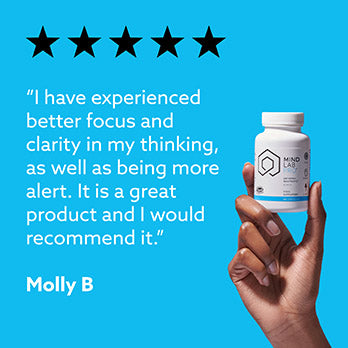Whether short-term or chronic, everyone's experienced brain fatigue to varying degrees. Yet, there's little to no variance in the responses to brain fatigue: no one likes it. Slow processing, poor mood, impaired memory -- the negative effects of brain fatigue are many; so many, in fact, that we may as well say that brain fatigue contributes to an all-out decline in cognitive performance.
- Nootropics for fatigue may help naturally reinvigorate an energy depleted brain for improved cognitive clarity, mood, motivation, stamina, and all-around mental performance.
And the best part: nootropics for fatigue actually work at enhancing the brain's natural energy capacity, as opposed to cheaply stimulating brain energy through unnatural, synthetic pathways. In this guide, we cover the ins and outs of brain fatigue as well as the natural nootropics you may take to reduce the negative effects of a tired brain.
What is Brain Fatigue?

Psychologically, brain fatigue relates to the subjective state of feeling overwhelmed, overworked, mentally and emotionally drained. In this sense, brain fatigue arises after a long, overdrawn shift of meaningless work, or after a series of Groundhog Day repetitions of committing the same tedious tasks over and over again. Enough, already!
However, while the subjective aspect of mental burnout may only be corrected by a change in lifestyle or perspective, the physiological side of brain fatigue may be improved by both lifestyle changes and dietary intake. And, yes, nootropics for brain fatigue may help.
Temporary bouts of brain fatigue may require a short nap or meditative rest, whereas ongoing, chronic fatigue may have greater health implications in the long run. Impaired mental clarity, poor focus, unstable mood swings -- these are the costs of an overtired brain, and, if left unattended, they may negatively impact your work performance and general well-being.
But where does brain fatigue come from?
Causes of Brain Fatigue
Fundamentally speaking, brain fatigue occurs through a lack or misuse of brain energy. Poor cognitive energy management contributes to tired, groggy, moody thinking, and the obvious offender in poor energy management is sleep deprivation.
According to the CDC, an estimated 1 in 3 adults don't get enough sleep. What's more, a 2008 poll by the National Sleep Foundation found that roughly 1 in 3 U.S. workers reported that daytime tiredness interfered with their work performance several times per week. College students are notoriously sleep deprived, and no one knows this better than the student-athletes.
Using the student-athlete as an example, consider the lifestyle of the average college athlete: practices and workouts intermittently throughout the day, courses to attend, homework to finish, peer group pressure to party on the weekends, sports recovery check-ins... Not only do student-athletes expend an inordinate amount of energy but they also subject their brains and bodies to an inordinate amount of stress while often foregoing sleep to maintain their relationships with non-athlete students.
Within this example, we see the Trifecta Factors involves in brain fatigue:
- Sleep Deprivation - without sufficient sleep, brain and body performance reliably suffer due to low energy recovery.
- Over-Working - excess energy expenditure requires excess energy intake and recovery to maintain cognitive performance.
- Stress - excess stress hormone cortisol may lead to substantial metabolic imbalances and other health issues.
Considering that the brain consumes nearly 20% of the body's total energy, cognitive impairment is to be expected under low energy conditions. When the body's energy levels decrease, mental performance also declines while the risk for age-related neurodegeneration increases.
 To keep the lights on upstairs, the brain demands a hefty energy supply.
To keep the lights on upstairs, the brain demands a hefty energy supply.
Symptoms of Brain Fatigue
Often used as a catch-all phrase for any decrease in focus and cognitive clarity, the term "brain fog" significantly overlaps with brain fatigue. However, brain fog seems more a symptom of brain fatigue, or poor brain energy metabolism, especially in the more advanced stages of brain fatigue.
Generally, brain fatigue contributes to total cognitive impairment; however, brain fatigue symptoms seem to particularly include decreases in:
- Task-related (working) memory
- Verbal recall
- Sleep quality
- Multitasking
- Processing mathematics
- Focus and attention
- Memory and learning
- Mood and motivation
The longer that brain fatigue symptoms go unaddressed, the longer it takes to rectify them. Addressing them early may go a long way in reducing your risk of chronic fatigue syndrome.
Chronic Fatigue Syndrome (CFS)
Whether due to lifestyle or biological factors, Chronic Fatigue Syndrome (CFS) is a severe, persistent lack of energy that often accompanies anxiety, stress, and sensory overload. Whereas short, temporary bouts of fatigue may be ameliorated by a good night's sleep or a quick nap, CFS is a more long-term, paralyzing condition. Extreme cases of CFS seem to almost occur spontaneously with no discernible cause. For such cases, it's generally recommended to consult a physician.
Stimulants vs. Nootropics: Which is Better?
Synthetic stimulants and so-called "smart pills" essentially work as go-go energy aids, amplifying mental energy and focus in quick, incredible, reliable bursts. However, stimulants don't exactly offer a long-term, viable solution for mental performance. If anything, they significantly impair cognitive function over time by depleting focus- and energy-related brain chemicals through hyperactivity.
Catecholamine neurotransmitters, such as dopamine, norepinephrine, and epinephrine, play a key role in focus, energy, and attention. Stimulants provides a quick-fix of catecholaminergic activity, yet do nothing to improve natural catecholamine levels. Natural nootropics, on the other hand, do.
Rather than flush the brain with a synthetic amount of catecholaminergic activity, nootropics may help brain activity by:
- Supplying raw catecholamine material.
- Improving catecholaminergic conversion processes.
- Enhancing cellular energy production.
And more. The benefit of supplementing nootropics over stimulants is that the former increases the natural pathways involved in better brain energy management while the latter might actually contribute to long-term brain fatigue. (Hence the increasingly addictive need for stimulants over time.) And the benefits of natural cognitive enhancement are many.
Benefits of Nootropics for Fatigue
While nootropics might lack the blunt, straightforward approach to increasing mental energy as demonstrated by synthetic stimulants, the diverse bio-pathways taken by a well-crafted nootropic stack cover a wide range of bio-benefits, including:
- Increased mitochondrial ATP energy output.
- Decreased stress hormone-related fatigue.
- Enhanced fat burning metabolism.
- Improved brain cell-to-cell communication.
- Optimized blood circulation across brain and body.
Combined, these bio-benefits help reduce the symptoms of brain fatigue for all-around better memory, focus, attention, mood, motivation, and cognitive clarity. And the combined benefits of those range anywhere from better work performance to an improved personal life. Nootropic supplements are a key element to a carpe diem lifestyle.
 Staying active is as much a mental game as it is a contest of physical prowess.
Staying active is as much a mental game as it is a contest of physical prowess.Mind Lab Pro® Nootropics for Fatigue
Rhodiola Rosea Extract
Many classify this powerful, herbal adaptogen as an energy booster, yet it's more accurate to call Rhodiola rosea a fatigue reducer.
Traditionally, Rhodiola rosea helped Siberian farmers and soldiers withstand the harsh conditions of frigid Siberia. Today, the herbal adaptogen is highly favored by athletes, academics, and workers for its profound mental and performance enhancement benefits. Both animal and clinical human studies found significant protection against fatigue with Rhodiola supplementation:
- Animal Study - administered to swimming mice, Rhodiola extract demonstrated significant reductions in fatigue caused by strenuous exercise.<1>
- Human Study - young, healthy physicians undergoing night shifts experienced general fatigue reductions with Rhodiola extract, as compared to placebo.<2>
As a highly bio-active adaptogen, Rhodiola seems to improve mental and physical performance under high stress, high activity conditions. While exercise and activity contribute to sturdier cognition in the long run, an excellent workout may result in impaired cognition within the short-term; especially for the active, sleep-deprived students and workers. Supplementing Rhodiola rosea extract may help sustain mental performance and stamina by warding off brain fatigue.
Look for Rhodiola rosea standardized extract. In higher dosages, plain Rhodiola powder may improve mental capacity and stamina. However, in supplement form, Rhodiola rosea extract -- standardized to 3% rosavins, 1% salidrosides -- seems to work best.
More on Mind Lab Pro® Rhodiola Rosea.
N-Acetyl L-Tyrosine
Under conditions of high stress and fatigue, the brain burns through natural L-tyrosine reserves to keep cognition afloat.
When L-Tyrosine levels deplete, so does mood and cognitive performance. As a key amino precursor in the catecholaminergic pathway, L-tyrosine converts to important mood- and focus-related brain chemicals, such as dopamine and norepinephrine. Particularly under conditions of high stress or sleep deprivation, supplementing L-tyrosine helps sustain mental performance and stamina; whereas healthy, well-rested users may only feel a slight boost on cognition.
As such, L-tyrosine qualifies as an "under pressure" nootropic; one to take to maintain composure in the face of exceptional work demands. For the busy, sleep-deprived student or worker, L-tyrosine may help reduce the usual cognitive impairments that accompany an over-worked, fatigued brain:
- One study on the effects of L-tyrosine on cognitive performance during extended wakefulness, or sleep deprivation (for 24+ hours), found L-tyrosine useful in "counteracting performance decrements during episodes of sustained work coupled with sleep loss."<3>
L-tyrosine (preferably in the enhanced N-Acetyl L-Tyrosine form) is an ideal mental "recharge" nootropic, essentially operating as the cognitive glue that keeps hard workers working hard without crashing hard mid-shift.
Try Stacking NALT + B Vitamins. Augmenting N-Acetyl L-Tyrosine with B vitamins may improve the catecholaminergic benefits of NALT thanks to B vitamins' key role in the catecholamine conversion processes. Not to mention that, as standalone nootropic ingredients, B vitamins may help reduce homocysteine damages on blood vessels, sustaining proper blood flow to the brain.
More on Mind Lab Pro® N-Acetyl L-Tyrosine.
Citicoline (CDP Choline)
Backed by several clinical studies, citicoline (as Cognizin®) boosts natural energy pathways while also increasing brain growth potential.
As an enhanced cholinergic nootropic, citicoline outperforms other popular choline options by accompanying its choline content with cytidine, the precursor to nucleotide uridine. Together, these two compounds seem to improve brain health by:
- Choline - increasing neurotransmitter acetylcholine activity for better memory, learning, and high-order cognitive processes.
- Cytidine - converting to uridine, an RNA nucleotide that seems to enhance neuronal synaptic plasticity and brain cell membrane integrity.<4>
Research suggests that Cognizin® Citicoline may significantly improve cognitive performance otherwise impaired by age-related energy deficits and other markers of neurodegeneration. The researchers' conclusion: "Citicoline supplementation may therefore help to mitigate cognitive declines associated with aging by increasing energy reserves and utilization, as well as increasing the amount of essential phospholipid membrane components needed to synthesize and maintain cell membranes."<5>
The mix of natural energy enhancement and neuroprotection makes citicoline particularly useful as a long-term brain booster. Taken daily, citicoline may significantly improve your mental energy levels, even in the face of the inevitable age-related cognitive decline.
Choline + Racetams. Certain synthetic cholinergics, such as racetams, may enhance the brain's acetylcholine activity, yet often come with "brain fog" side effects. Supplementing a premium choline source, such as citicoline, may reduce the occurrence of such adverse effects by providing an additional supply of raw acetylcholine precursor.
More on Mind Lab Pro® Citicoline.
Phosphatidylserine (PS)
As a key phospholipid in brain cell membranes, phosphatidylserine not only maintains neuronal health but it also enhances the brain's use of glucose for better energy production.
Used by nootropic enthusiasts for its multiple benefits on brain health and performance, phosphatidylserine (PS) is a nootropic powerhouse with far-ranging cognitive benefits. Best known for its restorative benefits on memory, particularly on age-related memory loss, PS tends to qualify more as an elderly brain health supplement than an acute brain booster.
Yet, PS also possesses research-backed benefits on brain energy enhancement, the likes of which may improve cognition affected by fatigue.
According to a preliminary human study on the effects of phosphatidylserine on cerebral glucose metabolism, PS supplementation may help users at risk of neurodegeneration by improving:
- Brain energy metabolism in the basal ganglia/thalamus by 20.3% and in the visual cortex by 19.3%.<6>
For the healthy athletic types, PS supplementation may also improve exercise stamina, increasing an athlete's running time before reaching exhaustion.<7> The ergogenic potential remains one of the more unexplored, yet promising, aspects of this multitasking phospholipid nootropic.
Phosphatidylserine + Caffeine? While not a conventional sports aid, the combination of PS and caffeine may attenuate the perception of fatigue during exercise, potentially giving athletes a mental edge over their competition.
More on Mind Lab Pro® Phosphatidylserine.
Maritime Pine Bark Extract
Supplying an antioxidant-rich complex of proanthocyanidins, maritime pine bark extract encourages healthy circulation while protecting against oxidative stress.
Poor circulation contributes to poor oxygen and nutrient intake in the brain. And, like the body, a poorly nourished brain struggles to perform properly. While not directly studied for energy, Maritime Pine Bark Extract has been suggested to increase Nitric Oxide (NO) activity, thereby improving cerebral circulation.
Popular among athletes and bodybuilders, NO boosters improve blood flow by helping blood vessels relax and dilate. The increase in circulation not only helps deliver oxygen to muscles for better muscular stamina but to the brain, as well, for better energy levels and cognitive clarity.
- Compounds that affect blood flow often come with adverse risks related to heightened blood pressure and heart rate. Fortunately, research has found maritime pine bark extract's circulatory benefits to be safe and well-tolerated.<8>
Maritime pine bark extract may indirectly reduce brain fatigue by enhancing cerebral circulation. Promoting healthy circulation to the brain is key to maintaining well-nourished, energized thinking.
In addition to improving circulation, maritime pine bark extract's antioxidant complex seems to also improve growth factor status in the brain; a bio-benefit shared by Lion's Mane Mushroom. Improving NGF and BDNF activity may help increase cognitive repair and vitality.
More on Mind Lab Pro® Maritime Pine Bark Extract.
Conclusion
Mind Lab Pro® supplies some of the best nootropic rejuvenators for brain fatigue in a single, simple, universal stack.
To the over-worked and over-tired, synthetic stimulants carry massive appeal, and for obvious reasons: they reliably boost energy, stimulate cognition, and feel very good. But only temporarily, and often at the cost of long-term brain health and energy.
- Mind Lab Pro®'s natural nootropics relieve mental fatigue without any follow-up crash. In fact, these cognitive enhancers promote better energy metabolism now for a better functioning brain in the future, optimizing 100% Brainpower™ for 100% of the time.
As the World's First Universal Nootropic™, Mind Lab Pro® takes a multi-faceted approach to combating fatigue that comprehensively covers all other important brain pathways. Its unique formula design hits the perfect nootropic synergy for every lifestyle -- academic, athletic, professional, and so on. No one feels left out with this stack.
Stack Mind Lab Pro® + Performance Lab® Energy for a Better Brain Recharge
 For better mental performance, Mind Lab Pro® offers clean, premium nootropics that enhance stim-free energy. However, for additional cellular energy support across the brain and body, look to:
For better mental performance, Mind Lab Pro® offers clean, premium nootropics that enhance stim-free energy. However, for additional cellular energy support across the brain and body, look to:
- Performance Lab® Energy by Opti-Nutra, a stimulant-free energy supplement that offers additional antioxidant support to Mind Lab Pro®'s comprehensive formula.
Rather than flushing the brain with synthetic stimulation, Performance Lab® Energy works by protecting and bolstering the body's primary ATP energy sources: mitochondria.
Stacking Mind Lab Pro® with Performance Lab® Energy may allow for better energy balance across the brain and body, amplifying total energy metabolism for all-around better performance. The benefits are both cerebral and ergogenic: energized thinking, charged stamina, and competitive performance for the athlete and academic.
More on Performance Lab® Energy.
Performance Lab® Energy Ingredients
Acetyl-L-Carnitine, R-Lipoic Acid (Bio-Enhanced®), Coenzyme Q10 (MicroActive® Q10), PQQ (BioPQQ®), Black Pepper Ext. (BioPerine®, 95% piperine)
- Performance Lab® Energy supports non-stim cellular energy, enhancing ATP energy production by improving mitochondrial function. Improves macro performance on the micro level, energizing brain and body without the use of stimulants.
Performance Lab® Energy and Mind Lab Pro® are both Opti-Nutra Quality.
References
- Kang D et al. Anti-Fatigue Effects of Fermented Rhodiola rosea Extract in Mice. Prev Nutr Food Sci. 2015 Mar; 20(1): 38-42.
- Darbinyan V et al. Rhodiola rosea in stress induced fatigue--a double blind cross-over study of a standardized extract SHR-5 with a repeated low-dose regimen on the mental performance of healthy physicians during night duty. Phytomedicine. 2000 Oct; 7(5): 365-71.
- Neri DF et al. The effects of tyrosine on cognitive performance during extended wakefulness. Aviat Space Environ Med. 1995 Apr; 66(4): 313-9.
- Agarwal N et al. Short-term administration of uridine increases brain membrane phospholipid precursors in healthy adults: a 31-phosphorus magnetic resonance spectroscopy study at 4T. Bipolar Disord. 2010 Dec; 12(8): 825-33.
- Silveri MM et al. Citicoline enhances frontal lobe bioenergetics as measured by phosphorus magnetic resonance spectroscopy. NMR in Biomedicine. 24 Sep 2008. https://doi.org/10.1002/nbm.1281
- Klinkhammer P et al. Effect of Phosphatidylserine on Cerebral Glucose Metabolism in Alzheimer's Disease. Dement Geriatr Cogn Disord 1990; 1:197-201.
- Kingsley MI et al. Effects of phosphatidylserine on oxidative stress following intermittent running. Med Sci Sports Exerc. 2005 Aug; 37(8): 1300-6.
- Liu X et al. Pycnogenol, French maritime pine bark extract, improves endothelial function of hypertensive patients. Life Sci. 2004 Jan 2; 74(7): 855-62.*
* Please note that many Pine Bark Extract studies include data and citations which are specific to Pycnogenol®, which is not an ingredient of Mind Lab Pro®.



































